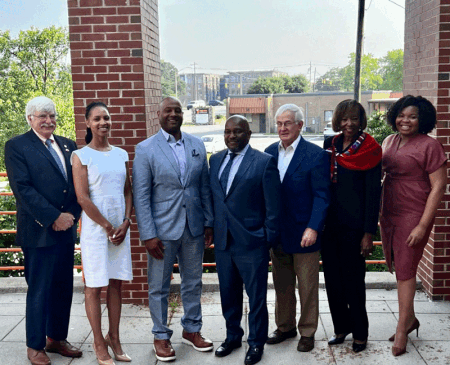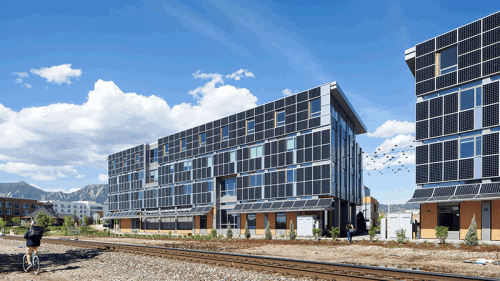The Fayetteville Street Corridor of Durham, North Carolina, is a spine through the city’s Hayti District, the historical location of many of the city’s Black-owned businesses with a reputation as a major hub of economic activity for much of the 20th century. The district was named by the founding fathers of the growing neighborhood after the Republic of Haiti—the only nation in the world created by a successful Black slave revolt.
The 1958 authorization to construct the Durham Freeway (Route 147) effectively dismantled much of the once-thriving Hayti community. Durham’s urban renewal programs in the late 1960s and early 1970s, combined with the freeway construction, caused long-lasting scars that included community trauma and wealth destruction.
Today, the Fayetteville Street Corridor—home to many small businesses, historical landmarks, and Black community organizations—endures as a gateway that remains vital to the economic development of Durham and the preservation of Black history and culture. The St. Joseph’s Historic Foundation/Hayti Heritage Center is a vibrant anchor for cultural arts programs related to the African American experience.
Involving the Community in Neighborhood Changes
In May 2022, the Hayti Heritage Center cosponsored a ULI Advisory Services panel with the ULI Foundation to study the Fayetteville Street Corridor. The goal of the panel was to identify opportunities for intentionally inclusive development that would involve the community in both neighborhood planning and economic participation.
The panel was led by chair Lyneir Richardson, co-founder and CEO, Chicago TREND, and executive director, Center for Urban Entrepreneurship & Economic Development, Rutgers Business School, Newark, New Jersey. He was joined by panel members Erika Brice, social investment officer, The Kresge Foundation, Troy, Michigan; Juanita Hardy, managing principal and senior consultant, Tiger Management Consulting Group, Silver Spring, Maryland; William G. Lashbrook III, senior vice president, PNC Real Estate (retired), Hopewell, New Jersey; Bayé Muhammad, CEO, Rochester Economic Development Corporation (REDCO), Rochester, New York; Tom Murphy, ULI senior resident fellow; and Julia Stevenson, director, Mid-Atlantic region, Langdon Park Capital, Washington, D.C.

From left to right: ULI Advisory Services panel members chair William G. Lashbrook III, senior vice president, PNC Real Estate (retired), Hopewell, New Jersey; Julia Stevenson, director, Mid-Atlantic region, Langdon Park Capital, Washington, D.C.; Bayé Muhammad, CEO, Rochester Economic Development Corporation (REDCO), Rochester, New York; panel chair Lyneir Richardson, cofounder and CEO, Chicago TREND, and executive director, Center for Urban Entrepreneurship & Economic Development, Rutgers Business School, Newark, New Jersey; Tom Murphy, ULI senior resident fellow; Juanita Hardy, managing principal and senior consultant, Tiger Management Consulting Group, Silver Spring, Maryland; and Erika Brice, social investment officer, The Kresge Foundation, Troy, Michigan. (ULI)
Focusing on a study area from Liberty Street to Cecil Street along the Fayetteville Street Corridor, the panel considered the following questions:
- What are the current and future land economics of the Fayetteville Street Corridor?
- What can the community—including residents, business owners, and landowners—do in the Fayetteville Street Corridor to take advantage of existing land uses?
- How can local organizations ensure that the residential homes in areas surrounding Fayetteville Street are affordable?
- How does Durham properly develop Fayetteville Street while maintaining its rich history?
- What opportunities are available to the community now, and in the future, to participate economically in the development of the Fayetteville Street Corridor as a whole?
- What strategic action steps will make the development of Fayetteville Street Corridor both an economically viable and community-centric success?
Recognize the Urgency of the Moment
Unprecedented market demand for property in Durham has created intense development pressure in Fayetteville Street Corridor area.
Panel chair Richardson observed, “Change to this historic neighborhood is palpable. The market demand for opportunity is coming. There’s an urgency of the moment that requires strategic action first—from the community, the residents, Black business owners, and Black-led organizations.”
The panel noted that much of the future of the community’s cultural, historic, and economic interests depends on the community’s ability to develop a collective shared vision. With millions of dollars poised to be invested in the Fayetteville Street area, the panel encouraged engaging a wide range of stakeholders to develop a strategic vision.
Panelist Murphy, ULI senior resident fellow and former mayor of Pittsburgh, said, “I want you to think about changing the narrative: How do you empower the next generation?”
A shared vision for local transportation is an important avenue for the preservation of community character. In its current configuration, Fayetteville Street does not serve residents or businesses well. Many people whom the panel interviewed described their reluctance to cross the street at certain places along Fayetteville Street. In panel interviews with stakeholders, a business leader remarked that “Fayetteville Street is not pedestrian friendly, bike friendly, or even vehicle friendly.”
Maintain Hayti’s Cultural and Historic Identity
The Fayetteville Street Corridor is home to landmarks that are part of the Hayti District’s rich history and culture. The panel recommended creative placemaking as an important strategy to reclaim the corridor. Placemaking engages a diverse array of partners and shapes neighborhood character around arts and cultural activities. These efforts help to grow a vibrant community and attract investment dollars.
Yet, successful placemaking may prompt a rise in property values, which can result in the unintended outcome of making the neighborhood unaffordable for longtime residents. Anti-displacement strategies are essential to ensure the security of legacy residents. Such efforts could include establishing an affordable housing plan to support low-income renters, reaching out to long-term homeowners about property tax relief programs, expanding community control of land, and increasing the capacity of community land trusts.
Leadership, Partnerships, and Collaboration
The panel recommended timely efforts to support a sustainable future for the Fayetteville Street Corridor, including the creation of a community-led organizing entity to engage with a variety of stakeholders. A separate development entity would be dedicated to commercial real estate development. Both entities would work together to support the community’s efforts to preserve its unique identity in the face of gentrifying pressure from downtown and surrounding neighborhoods.
The panel recommended that lead partners include Black-led institutional anchors such as North Carolina Central University (NCCU), Lincoln Community Health Center, the St. Joseph’s Historic Foundation, and the Hayti Heritage Center, in collaboration with public agencies such as the Durham County Board of Commissioners and the Durham Housing Authority, as well as residential and commercial developers and property owners. The panel realized that these recommendations will require dedicated financial resources rooted in a vision for racial equity and thus proposed a $63 million budget, with sources from a mix of public sector, private investment, and philanthropic sources.
Next Steps
In November 2022, the Hayti Heritage Center hosted a community gathering to share the final report from the ULI Panel.
“We used the ULI report as the ‘wet clay’ for us to start to move things forward. Obviously, it’s only one small part of a bigger mission. The bigger mission is making sure that the community has a voice in this as well,” said Charles Robinson, the Fayetteville Street Corridor Committee member and real estate investor with Robinson Capital Group. Plans are now underway to form a Community Development Corporation.
Angela Lee, executive and artistic director of the Hayti Center, added, “We want to see growth that actually creates generational wealth, because that opportunity was destroyed when the highway came through. We never forget that this is not just the group of us trying to do these things. We want input from the folks who have lived here, who have businesses here, who are especially invested and will be impacted for generations to come.”
DEBORAH L. MYERSON is a housing and community development consultant based in Bloomington, Indiana. She served as the panel program manager for the ULI Durham panel on the Fayetteville Street Corridor.
More About the Durham, North Carolina, Fayetteville Street Corridor Advisory Services Panel: Interested in more? See the panel’s presentation slides, watch the panel present their recommendations, or read the complete panel report.






